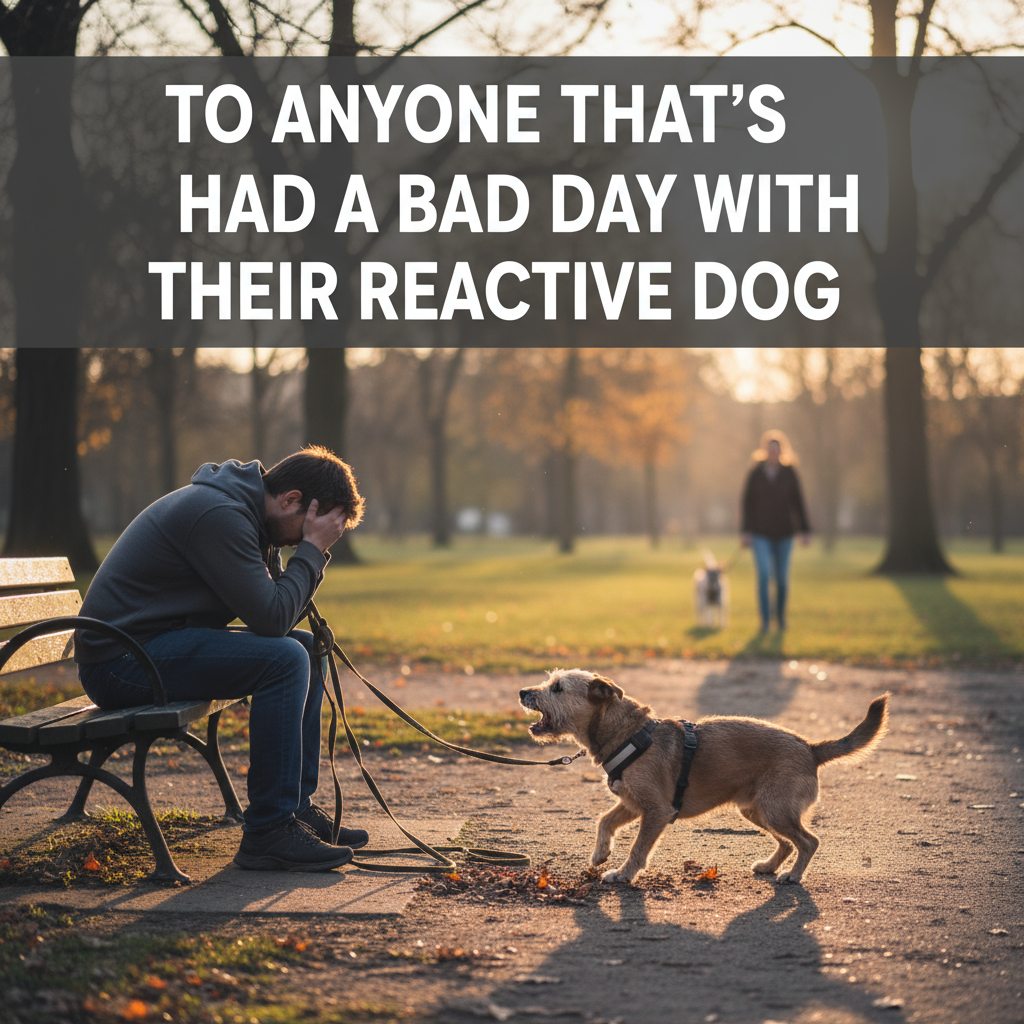To Anyone That’s Had a Bad Day With Their Reactive Dog
Estimated reading time: 5 minutes
- Understanding reactivity and its underlying causes is crucial.
- Community support can make a significant difference.
- Structured routines help ease anxiety for both dogs and owners.
- Behavioral modification techniques, like counter-conditioning, are effective.
- Stay calm and seek professional help if needed.
Table of Contents
Understanding Reactive Dogs
Causes and Solutions
Managing the Emotional Toll
The Importance of Support and Community
Useful Tools and Equipment
Establishing a Positive Routine
Practical Advice for Bad Days
In Summary
FAQ
Understanding Reactive Dogs
Causes and Solutions
Managing the Emotional Toll
The Importance of Support and Community
Useful Tools and Equipment
Establishing a Positive Routine
Practical Advice for Bad Days
In Summary
FAQ
Understanding Reactive Dogs
Firstly, it’s essential to clarify what we mean by “reactive dogs.” Contrary to common misconceptions, these dogs are not innately aggressive but instead exhibit exaggerated reactions due to various triggers. This can manifest as barking, lunging, or growling when they encounter specific stimuli in their environment (source: PetMD). The causes behind reactivity can be multifaceted, encompassing genetics, inadequate socialization, traumatic experiences, and even underlying medical issues (source: Occanine Coaching).
Causes and Solutions
- Socialization and Training: The absence of early socialization can lead to reactivity in adulthood. Puppies benefit immensely from exposure to different environments, sounds, and experiences. However, it is crucial to note that adult dogs can still flourish with the right training and desensitization techniques (source: Occanine Coaching).
- Identifying Triggers: Understanding what incites your dog’s reactive behavior is vital for effective management. Common triggers include other dogs, unfamiliar strangers, children, and environmental factors like loud noises or sudden movements (source: PetMD).
- Behavioral Modification: A key strategy in managing reactivity is behavioral modification, which often involves counter-conditioning. This technique aims to replace negative associations with positive experiences through patience and positive reinforcement (source: Cornell University College of Veterinary Medicine).
Managing the Emotional Toll
As any owner of a reactive dog can attest, having a dog that reacts poorly can do more than inconvenience your outings; it can also take a toll on your emotional and mental health. Owners may experience stress, frustration, and anxiety whether they’re at home or out in public (source: Dogs Today Magazine). You might find yourself avoiding certain places or situations, fearing your dog’s reactions might escalate.
The Importance of Support and Community
Finding a community is invaluable for anyone struggling with a reactive dog. Connecting with fellow pet owners in similar situations allows for shared experiences and practical advice. Online forums, social media groups, and local meetups can offer support, encouragement, and friendship as you navigate your challenges (source: Puppy Leaks).
Useful Tools and Equipment
Certain tools can significantly help in managing reactive behaviors during walks. Equipment such as Gentle Leaders and Easy Walk Harnesses can provide better control and comfort for both you and your dog. In stressful situations, crates can serve as safety zones, allowing dogs to decompress and feel secure while giving owners peace of mind (source: Wagbar).
Establishing a Positive Routine
Creating a structured routine can be beneficial for both reactive dogs and their owners. Predictability helps ease anxiety and fosters a stronger bond between you and your dog. Ensuring regular walks, play sessions, and training exercises can help focus your dog’s energy in productive ways, reducing the likelihood of reactive episodes (source: Chill Out Dog Training).
Practical Advice for Bad Days
When bad days seem to overwhelm, here are some strategies to consider:
- Stay Calm: As your dog reacts to a trigger, your demeanor is critical. Remaining calm and composed helps de-escalate the situation, reassuring your dog that it’s okay.
- Seek Professional Help: If you’re feeling stuck, consulting with a qualified dog trainer or behaviorist can provide a tailored approach to managing your dog’s reactivity, ensuring that both you and your pet are on the right path.
- Patience and Consistency: Remember, recovery from reactivity is not an overnight process; it requires a long-term commitment. Celebrate small victories and remain consistent in your training efforts.
In Summary
Dealing with a day that feels particularly tough when managing a reactive dog can be challenging. Recognizing that you are not alone in this experience is the first step towards finding effective solutions. Understanding the underlying causes of reactivity, leveraging community support, utilizing appropriate tools, and maintaining a positive routine are all essential elements in your toolkit as a pet owner.
By focusing on gradual improvements and cultivating patience, both you and your dog can work towards a calmer and more enjoyable lifestyle together. Remember, every step forward is a victory worth celebrating.
For more pet care tips and guides, visit Pet Blog.
FAQ
What are the common triggers for reactive dogs?
Common triggers include other dogs, unfamiliar strangers, children, and environmental factors like loud noises or sudden movements.
Common triggers include other dogs, unfamiliar strangers, children, and environmental factors like loud noises or sudden movements.
How can I help my reactive dog?
Implement behavioral modification techniques, provide consistent training, and create a structured routine to help your dog feel secure.
Implement behavioral modification techniques, provide consistent training, and create a structured routine to help your dog feel secure.
When should I seek professional help?
If you’re feeling overwhelmed or stuck, consulting with a qualified dog trainer or behaviorist can provide guidance tailored to your situation.
If you’re feeling overwhelmed or stuck, consulting with a qualified dog trainer or behaviorist can provide guidance tailored to your situation.
